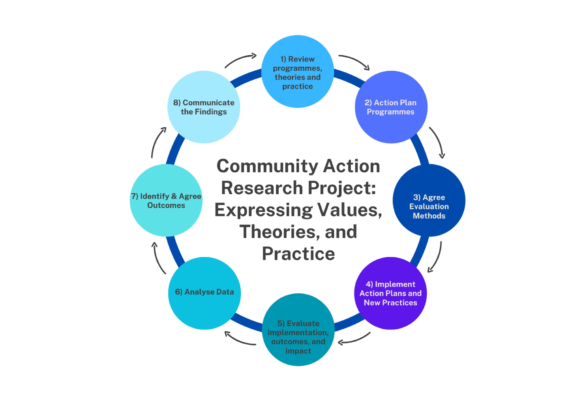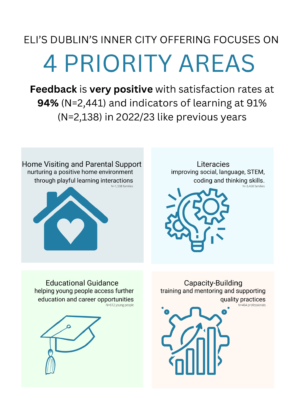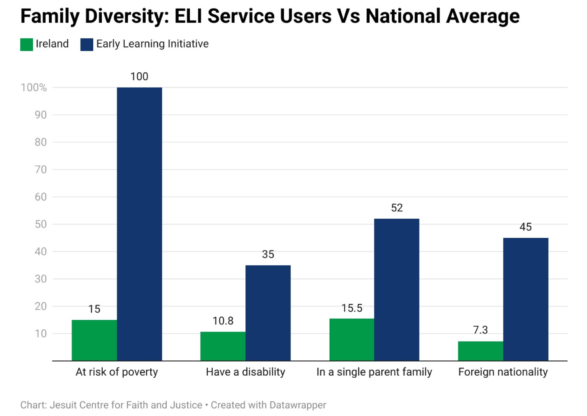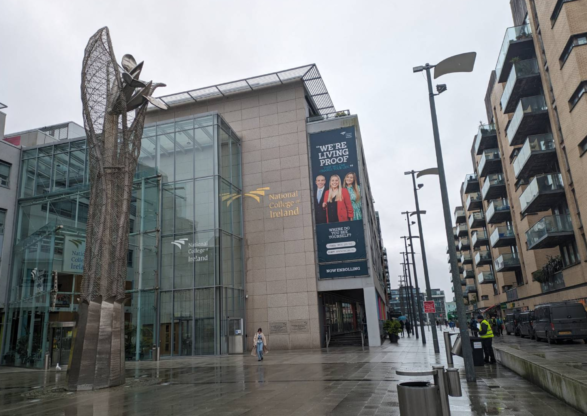
Dr Josephine Bleach
Dr Josephine Bleach is the Director of the Early Learning Initiative at the National College of Ireland. She was awarded a PhD by Trinity College Dublin in 2008 and has published extensively on the topics of early learning and parenting.
Stretching into Friday 24th November 2024, as Director of the Early Learning Initiative (ELI), National College of Ireland (NCI), my phone lit up with lots of messages about the violent assault and subsequent rioting in our community. Our work to date in delivering home visiting programmes since 2007 and our learning within the North-East Inner- City (NEIC) from coping with the violence associated with the 2016 gangland feud served us well. We immediately instigated our critical incident policy. Our team of
home visitors began contacting the families they visited to ensure that they were okay. Over the next few days, weeks, and months, we supported our families to restore their sense of safety, security, and belonging in Dublin’s Inner City. Visiting families, some of whom had literally barricaded themselves
into their accommodation terrified to venture out, Home Visitors were anxious to reassure children and parents that they were welcome in the area, that they had friends in the community, and that we would continue to visit and support them. The work continues with much collective reflection on our response and the supports being offered to the diverse range of families living in the area.
Our response to the violence in Dublin’s Inner City was a prime example of how prevention and early intervention works for children, families, communities, and for Government. It was the result of years of planning, relationship building, collaboration, hard work, multiple ongoing innovations and restorative
conversations between children, parents, frontline service delivery staff, local organisations, businesses, statutory agencies, policy makers, and politicians. It highlights the importance of ongoing prior community development and innovation when a crisis occurs as well as demonstrating how early childhood home visiting (ECHV) is a proven service delivery strategy that helps children and families thrive. It is an essential local community lifeline.
This paper outlines how ECHV started in Dublin’s Inner City, the innovative community action research process used, and how local Home Visitors – all women employed by NCI – have become a crucial support for families through good times and bad. It also highlights how a community, with Government support, develops the resilience required to deal with and heal from unexpected traumatic violent
circumstances.
BACKGROUND
NCI is a third level learning, teaching, and research institution with an unwavering commitment to widening access to higher education, a provider of degree and master’s programmes in Business, Computing, and Education, to over 6,000 students. In 2002, NCI relocated to the NEIC and established
ELI to ‘change lives through education’ through the provision from birth of an integrated prevention and early intervention programme of activities, training and support for children, parents, and educators.1
An initial survey of need found that while local parents had high educational aspirations for their children, they did not understand their pivotal role and were not confident that they had the skills to support their children’s learning.2 International research shows that early learning is the foundation for all future learning and success at school. At three years of age, there are already big differences in
language development between children from affluent and low-income backgrounds. This gap continues to widen, determining a child’s educational outcome before they even start primary school.
With support for parents as the primary educators of their children a priority, involving local people as co-constructors of programmes and in the decision-making processes was perceived as key to educational change.3 Central to the work of ELI is the belief that early intervention and a supportive home learning environment are critical if children and young people are to achieve their full potential. As a result, a community action research approach was chosen to develop ELI’s programmes.4 Acknowledging, respecting, and utilising the expertise and experience within local families and communities is at the heart of the cyclical process, which revolves around participants coming together to deliver high quality services and share their learning.
ELI’s programmes start with the objective of addressing an emerging real need with a few families asked to trial and critique a pilot initiative. Using their feedback, a programme is developed, trialled with more
families, and if working, it enters our annual community action research process. Working in partnership with our colleagues locally and nationally, the programme can be then scaled up. There is a continuous feedback loop with children and parents actively participating in the ongoing development of the programme. As one participant said, ‘[w]e are listened to by the ELI. They follow up on suggestions and see them through. Our needs are addressed, and ELI keeps in contact with us.’5
From 400 participants in 2008, ELI delivered 25 educational support programmes to 5,528 families in Dublin Inner City, alongside another 3 programmes to 2,946 families nationally in 2022-23.6
HOME VISITING – A SPECIAL RELATIONSHIP AND CRITICAL LIFELINE FOR FAMILIES
Research in Ireland, which is corroborated internationally, consistently finds that parents have a powerful influence on their children’s educational and social development.7 This is also reflected in the
Irish constitution which recognises the crucial role of the family as the natural and primary educator of the child (Article 42.1, 1937) with rights and duties to active participation in their children’s
education. Research has also shown that early education is key, with early childhood home visiting significantly improving the lives of children and their families.8 Demonstrable impacts include improving maternal and child health, preventing child abuse and neglect, increasing family education and earning potential, promoting children’s development and readiness to start school, and connecting families to needed community resources and support.
Choosing a suitable home visiting programme to start with was difficult. Eventually ParentChild+ was chosen as it had more than forty years of rigorous research demonstrating its success in the United States.9 It takes a non-didactic approach, enabling adaptation to the Irish context. It maintains a focus on parents as equal partners with Home Visitors in ensuring children develop the language and literacy skills needed to start school ready Choosing a suitable home visiting programme to start with was difficult. Eventually ParentChild+ was chosen as it had more than forty years of rigorous research demonstrating its success in the United States.9 It takes a non-didactic approach, enabling adaptation to the Irish context. It maintains a focus on parents as equal partners with Home Visitors in ensuring children develop the language and literacy skills needed to start school ready to learn. It began in the Dublin Docklands in 2007 with five Home Visitors and 15 families. Today, ELI directly supports 20 organisations delivering home visiting to 1,500+ families nationally, while advocating for all 4,340 families receiving home visiting in Ireland through the Home Visiting Alliance. However, NCI’s priority remains Dublin’s Inner City and our local NEIC community. In 2022/23, 238 families who received an ELI delivered Home Visiting Programme lived in the NEIC, representing 71% of ELI Home Visiting families in Dublin (N=337). This has increased by 24% since 2021/2022 (N=192). Family diversity is reflected in figure 3 below, which compares the national statistics from 2023 State of the Nation’s Children Report with data collected by ELI in 2022/23.
THE RANGE OF ELI HOME VISITING PROGRAMMES
Dublin’s Inner City families usually begin their ELI Home Visiting and Parent Support journey with our ABC 0-2 programme, which aims to improve the long-term developmental outcomes for children from pre-birth to two years of age.10 Through weekly visits, the Home Visitor and parents discuss how baby and parent are doing with a focus on attachment, nutrition, sleep, health care and over-all child wellbeing. Home Visitors also demonstrate baby massage, which relaxes both parent and child and encourages lots of cuddle and tummy time for baby. In 2022/23, 128 ABC 0-2 families received 1,236 visits.
When the child is around 16 months, some families move on to our ParentChild+ Programme, which is an innovative 2-year literacy and parenting programme that strengthens families and prepares children to succeed academically. In their twice-weekly visits, Home Visitors model for parents how to talk, read, and play with their children. Families then continue these activities between visits. In 2022/23, 138 ParentChild+ families received 3,915 visits.
With the increase in families in homeless and emergency accommodation, Home Visitors developed the Home from Home Programme, which is an adaption of ParentChild+ but in 12- week blocks. In 2022/23, 27 Home from Home families received 211 visits. Having reached out to former participants during COVID-19 and seeing the challenges they were experiencing; the Stretch Graduate Programme was developed. It provides differentiated supports to families, who have finished our ECHV programmes. In 2022/23, 40 Stretch Graduate families received 315 visits with another 34 receiving termly check-in calls. Home visiting is supplemented by Parent Support Programmes, where parents can learn more about supporting their children’s learning, developing their parenting networks, and accessing other services in the area. In 2022/23, 1,065 parents attended ELI’s Parent Support Groups (N=775) and parenting courses (N=290).
COMMUNITY RECOGNITION FOR ELI INITIATIVES
For NCI, employing local people as ELI Home Visitors was critical to the engagement and ownership by the local community. Easily recognisable in their distinctive uniforms, the Home Visitors are the ambassadors for education and parent support on the street and provide an accessible point of contact, information, and referral for families. Known as the ‘book people’ and/or ‘pink ladies,’ extended family members encourage new parents to contact the Home Visitors for support. People stop them in the street to ask for help, with contact details recorded on hairdresser cards, bookies slips, and receipts. Referrals also come from our local partner organisations, in particular the Public Health Nurses (PHNs), Speech and Language Therapists (SLTs), Tusla Family Support Workers, and most recently the Children’s Disability Network teams. This note from a parent in 2022 highlights the support provided and its impact on families.
‘Thank you for your support during this time. You were there in our tiny apartment and the stressful situation we were living in. You were there when I could not stop crying and feeling lonely. Thank you for the job you do. Supporting families like you do is essential in some situations and it really makes the difference. Waiting for your weekly home visiting sometimes really saved my life. I really hope I’ll meet you again, ‘till then I wish you the best of luck. And thank you, thank you again.’
Evaluations, both internal and external, continually highlighted the positive impact of ELI’s Home Visiting Programmes on the families involved with parents learning a different and more enjoyable approach to relating, talking, reading, and playing with their children. The children involved are developing normally for their age with the benefits extending to siblings and extended family. At developmental checks, PHNs notice the gains made by children who are on ELI’s Home Visiting and Parent Support Programme and those who are not. SLTs see the improvement in the children on their waiting lists (2.5 years wait), the vast majority of whom no longer need speech therapy. Primary teachers see these children enter primary school ready to learn. As one parent told us:
‘The Home Visitor is very good with my child and I’m learning a lot from the techniques she’s been using. I’d never have known how to explain properly or encourage him in the ways I am now. My reading has come on better and I am calm. I am a lot more relaxed, and my child is the same with me.’
GOING BEYOND LITERACY AND NUMERACY
Over the years Home Visitors have supported families through many challenges: intergenerational poverty, unemployment, social isolation, trauma, mental health issues, educational disadvantage, homelessness, violent feuds, COVID-19, as well as long waits for disability and other child services. Indeed, during the peak of the pandemic, Home Visitors were some of the only people in contact with the most isolated families, delivering home learning packs, checking in with 345 vulnerable parents and virtually visiting families to support home education and well-being.11 As one parent told us, “Thanks for
everything these last 2 years. Even with all the madness you still went above and beyond for us, and we’ll be forever grateful.” Despite all that goes on in our Dublin’s Inner City community, including the recent riots, parents continue to sign up and engage in the programmes. With the support of our local Home Visitors, whose mission is to ‘save the next generation,’ parents strive to provide a happy, secure educational home learning environment for their children. They are determined that their children will
thrive in education, career and life.
HOME VISITING AS A GRASSROOTS-DRIVEN MEANS OF COMMUNITY CHANGE
Successful change is complex. While positive changes in one family and service is always welcome, it is the collective impact on a number of families and services in an area and the national system that is needed for best emerging practices and continuous improvements to be resourced and embedded into policies and organisations.12
ELI’s success is due to its network of partners, including Government, whose long-term sustainable support enables us to innovate and pivot to meet the emerging needs of the families and communities we work in. While all contributions are welcomed, tribute must be paid to ongoing reflective practice and advocacy of our local Home Visitors. It is their voices, informed at the front-lines, that have been critical to the identification of gaps in service provision for local families and subsequent innovations. One example of this is a programme that was funded by the National Early Years Access Initiative in 2011 called the Docklands Early Numeracy Programme. This embedded early numeracy into all ELI programmes, in response to the insights of our Home Visitors. In 2014 as part of the national Area Based
Childhood (ABC) Programme, Home Visitors, in collaboration with the local PHNs, developed the ABC 0-2 Programme, and now through Sláintecare, they have integrated it into the national Community Families Programme. Subsequently they developed the Home from Home and Stretch Graduate Programmes. Since 2016, they have been involved with the NEIC Initiative, the critical incident group, and other relevant local networks.
As conflict, trauma and violence increased in the area, they incorporated Restorative Practice, Trauma Informed Practice and Infant Mental Health into their engagement with families. With the increase in waiting lists for assessments and services for children with a disability, our Home Visiting Team applied
for Toy Show funding for the Parenting365 programme, which supports families with children with additional needs. In 2022/23, 64 families engaged in the Parenting365 programme, with one parent saying, ‘For the first time I didn’t feel alone. I learnt a lot about different needs. It’s been amazing talking to the staff and learning their experiences.’ Through the Home Visiting Alliance, Dublin’s Inner City Home Visitors have been involved in the development of the national approach to home visiting as part of the First 5 agenda,13 as well as a Home Visiting Feasibility Study and Data Framework which will inform the Government’s vision for home visiting, shaping its delivery at both local and national level for
the foreseeable future.
CONCLUSION: HOW TO BUILD ON THIS SUCCESS
As a third level institution founded by the Jesuits, social justice is at the heart of what NCI does. When NCI established ELI, parents told us, ‘I love my child. I want them to do well but I don’t know how.’14 Figuring out this ‘how’ in an ever-changing context is what Home Visitors and parents, supported by NCI, do together. Offering a listening ear and compassionate voice, while promoting the dignity, autonomy, and responsibility of children and parents for their own learning, decisions, and lives, is central to the Home Visitors’ role. Collaborating with Government, partner organisations and colleagues to support families and create high-achieving positive learning communities, where everyone works together to enable children to thrive, is an essential element of ELI’s Home Visiting Programmes. Our community action research processes support reflection on experience and practice; and the collection of data to measure progress, assess impact, develop theories and address emerging needs. Together with Government and our partners, ELI’s Home Visiting Team have helped create a more just, humane and supportive community in Dublin’s Inner City that is responsive to the needs of its most vulnerable population, while advocating for positive systemic change.
Resilience is the ability to bounce back from adversity, adapt to challenges, and recover from setbacks. While Dublin City Council workers cleaned up the streets after the riots and restored the physical space, Home Visitors were addressing the emotional and mental trauma experienced by children and families and supporting them to recover from these awful events. Over the weeks and months following the violent incidents, families came into the safe space of NCI to celebrate togetherness and our resilience at the Rummikub Competition (N=70), Christmas Party (N=250), Parenting365 (N=20) and STEM Play and Learn events (N=53). Quietly n homes and organisations all over Dublin’s Inner City, restorative conversations were being held on how we can support each other to move forward and create better brighter futures for our children and community.
Immigration, homelessness, and the influx of refugees are key issues in Ireland today. In Dublin’s Inner City, we have dealt with these issues for years and have created, despite the impression given during the riots, an inclusive community, where agencies work together to welcome and support the indigenous
population as well as the newcomers from all nationalities, creeds and cultures.
Home visiting has been key to creating an open-minded, tolerant, welcoming learning environment by offering supportive wraparound services for children and parents living in our neighbourhood. For families, who are socially isolated and excluded, home visiting gives them a sense of solidarity and community in terms of knowing they are not alone in the challenges they are facing. Nobody knows what the future holds for our society, but with Government and partners’ support, our Home Visitors will rise to these challenges and continue to support families in Dublin’s Inner City to ensure that children in our community, no matter who they are or where they come from, thrive in education, career, and life. The power of home visiting to forge connections within a community is explained by a member of our Home Visiting team:
‘Having been reared and worked in the inner city, I feel with working with migrant families that I have learned and understood more about migrants’ culture and values which has changed my perspective, so while they benefit from the working with the Home Visitors, we also benefit from working with the families too. ELI is a doorway into the community for many families.’
The biggest challenge for ELI, our Home Visiting team and our partner NEIC prevention and early intervention services is securing the funding to meet the existing and increasing complex needs of children and families in the area. With no committed multi-annual funding, it is very hard to plan sustainable services and provide security to both families and professionals delivering services. While the Department of Children, Equality, Disability, Integration and Youth, Tusla and NEIC are very supportive to ELI, they are reliant on annual State funding and cannot commit beyond the calendar year.
The image that comes to mind as we make the rounds of public servants, both local and national, is that of the Little Red Hen, continuously being told, “Not I”. Luckily, to date, with support from our amazing partners and supporters, we have been able to do it ourselves, but it is tough going trying to meet the diverse emerging needs of marginalised children and families without adequate secure multi-annual funding. We call on Government, both local and national, to take responsibility for the wellbeing of our community and adequately resource essential services, such as ELI’s Home Visiting Programme, for the
most at-risk children and families in vulnerable communities. Otherwise, the community will have few resources and little resilience to respond to incidents such as those on Thursday 23rd November 2024.
Footnotes:
1 Early Learning Initiative (ELI), “End of Year Report 2015-16” (Dublin: National College of Ireland, 2016).
2 Dartington Social Research Unit, “National College of Ireland Early Learning for Children in North Docklands: Report of Findings” (Dublin: National College of Ireland, 2006).
3 Josephine Bleach, “Improving Educational Aspirations and Outcomes through Community Action Research,” Educational Action Research Journal 21, no. 2 (2013): 253–66.
4 Josephine Bleach, “Community Action Research in Ireland: Improving Educational Outcomes through Collaboration in the Dublin Docklands,” in Palgrave International Handbook of Action Research, ed. L. Rowell et al. (New York, NY: Palgrave Macmillan, 2016), 177–88.
5 Early Learning Initiative (ELI), “End of Year Report 2008-09” (Dublin: National College of Ireland, 2009).
6 Early Learning Initiative (ELI), “End of Year Report 2022-23” (Dublin: National College of Ireland, 2023), https://www.ncirl.ie/Portals/0/ELI/ELI Annual Reports/ELI End of Year Report 2022-23
final.pdf.
7 Margaret Josephine Bleach, Parental Involvement in Primary Education in Primary Education in Ireland (Dublin: Liffey Press, 2010).
8 Josephine Bleach and Susan Brocklesby, “Early Childhood Home Visiting in Ireland,” Education Matters Yearbook (blog), 2023, https://irelandseducationyearbook.ie/downloads/IEYB2023/
Irelands%20Yearbook%20of%20Education%202023%20-%20Early%20Childhood-7.pdf.
9 National College of Ireland, “ParentChild+ Programme,” Early Learning Initiative, 2022, https://www.ncirl.ie/About/Early-Learning-Initiative/Dublins-Inner-City-Programmes/Support-for-
Parents/ParentChild-Programme.
10 Early Learning Initiative (ELI), “End of Year Report 2022-23.”
11 Josephine Bleach, “Parents’ Voices through the COVID-19 Pandemic, Family Wellbeing and Home Education.,” Education Matters Year Book (blog), 2021, https://irelandseducationyearbook.ie/downloads/IEYB2021/YB2021-Primary-13.pdf.
12 Bleach, “Community Action Research in Ireland: Improving Educational Outcomes through Collaboration in the Dublin Docklands.”
13 Government of Ireland, “About First5,” Gov.ie, September 28, 2023, https://www.gov.ie/en/campaigns/5d81e-about-first5/?referrer=https://first5.gov.ie/.
14 Dartington Social Research Unit, “National College of Ireland Early Learning for Children in North Docklands: Report of Findings.”





